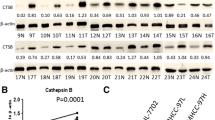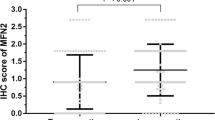Abstract
Cox-2, Survivin and Bcl-2 are frequently overexpressed in numerous types of cancers. They are known to be the important regulators of apoptosis. This study was designed to investigate the correlation between the clinical characteristics and the expression of Cox-2, Survivin and Bcl-2 in hepatocellular carcinoma. A total of 63 postoperative hepatocellular carcinoma (HCC) samples, 10 adjacent non-tumor samples and 10 normal liver samples were immunochemically detected for the expression of Cox-2, Survivin and Bcl-2. A median follow-up of 4 years for the 63 HCC patients was conducted. Univariate tests and multivariate Cox regression were performed for statistical analysis. The Kaplan–Meier method was used to analyze the survival. Positive expression of Cox-2 (84.3%) and Survivin (77.8%) was detected significantly more frequently in the HCC samples than in the normal liver tissues (30% and 0, respectively). Bcl-2 was highly expressed in the adjacent non-tumor tissue. Cox-2 was positively correlative to Survivin. Survivin and Bcl-2 were significantly associated with the pathological grade of HCC (P < 0.05). Expression of both Cox-2 and Survivin was significantly associated with the poor overall survival (OS) (P = 0.0141, P = 0.0039). Furthermore, multivariate analysis confirmed the independent prognostic value of Survivin expression, along with tumor size and hepatic function. Cox-2 and Survivin were highly expressed in the HCC tissue. Survivin and Bcl-2 were significantly associated with the pathological grade of HCC. The expression of Survivin was an independent prognostic factor for HCC after a hepatectomy. Treatment that inhibits Survivin may be a promising targeted approach in HCC.






Similar content being viewed by others
References
Bruix J, Sherman M, Llovet J, et al. Clinical management of hepatocellular carcinoma. Conclusions of the Barcelona-2000 EASL conference. European Association for the study of the liver. J Hepatol. 2001;35(3):421–30.
Parkin DM, Bray F, Ferlay J, et al. Estimating the world cancer burden: Globocan 2000. Int J Cancer. 2001;94(2):153–6.
Thomas MB, Zhu AX. Hepatocellular carcinoma: the need for progress. J Clin Oncol. 2005;23:2892–9.
Kelley RK, Alan P. Venook. Sorafenib in hepatocellular carcinoma: separating the hype from the hope. J Clin Oncol. 2008;26:5845–8.
Zhu AX, Sahani DV, Duda DG, et al. Efficacy, safety, and potential biomarkers of sunitinib monotherapy in advanced hepatocellular carcinoma: a phase II study. J Clin Oncol. 2009;27:3027–35.
Koki AT, Masferer JL. Celecoxib: a specific Cox-2 inhibitor with anticancer properties. Cancer Control. 2002;9(2Suppl):28–35.
Santini D, Vincenzi B, Tonini G et al. Cyclooxygenase -2 overexpression is associated with a poor outcome in resected ampullary cancer patients. Clin Cancer Res. 2005;11(10):3784–9.
Shi H, Xu JM, Hu NZ, Xie HJ. Prognostic significance of expression of cyclooxygenase-2 and vascular endothelial growth factor in human gastric carcinoma. World J Gastroenterol. 2003;9:1421–6.
Khuri FR, Wu H, Lee JJ, et al. Cyclooxygenase-2 overexpression is a marker of poor prognosis in stage I non-small cell lung cancer. Clin Cancer Res. 2001;7:861–7.
Ferrandina G, Ranelletti FO, Legge F, et al. Prognostic role of the ratio between cyclooxygenase-2 in tumor and stroma compartments in cervical cancer. Clin Cancer Res. 2004;10:3117–23.
Raspollini MR, Amunni G, Villanucci A, et al. Expression of inducible nitric oxide synthase and cyclooxygenase-2 in ovarian cancer: correlation with clinical outcome. Gynecol Oncol. 2004;92:806–12.
Kawasaki H, Toyoda M, Shinohara H, et al. Expression of Survivin correlates with apoptosis, proliferation, and angiogenesis during human colorectal tumorigenesis. Cancer. 2001;91:2026–32.
Salz W, Eisenberg D, Plescia J, et al. A survivin gene signature predicts aggressive tumor behavior. Cancer Res. 2005;65:3531–4.
Sui L, Dong Y, Ohno M, et al. Survivin expression and its correlation with cell proliferation and prognosis in epithelial ovarian tumors. Int J Oncol. 2002;21:315–20.
Caldas H, Jaynes FO, Boyer MW, et al. Survivin and granzyme B-induced apoptosis, a novel anticancer therapy. Mol Cancer Ther. 2006;5:693–703.
Ryan BM, Konecny GE, Kahlert S, et al. Survivin expression in breast cancer predicts clinical outcome and is associated with HER2, VEGF, urokinase plasminogen activator and PAI-1. Ann Oncol. 2006;17:597–604.
Reed JC, Miyashita T, Takayama S, et al. Bcl-2 proteins: relators of cell death in the pathogenesis of cancer and resistance to therapy. J Cell Biochem. 1996;60(1):23–32.
Martínez-Arribas F, Alvarez T, Del Val G, et al. Bcl-2 expression in breast cancer: a comparative study at the mRNA and protein level. Anticancer Res. 2007;27:219–22.
Leahy DT, Mulcahy HE, O‘Donoghue DP, et al. Bcl-2 protein expression is associated with better prognosis in colorectal cancer. Histopathology. 1999;35(4):360–7.
Athanassiadou P, Grapsa D, Athanassiades P, et al. The prognostic significance of Cox-2 and survivin expression in ovarian cancer. Pathol Res Pract. 2008;204:241–9.
Barnes N, Haywood P, Flint P, et al. Survivin expression in in situ and invasive breast cancer relates to Cox-2 expression and DCIS recurrence. Br J Cancer. 2006;94:253–8.
Krysan K, Merchant FH, Zhu L, et al. Cox-2-dependent stabilization of Survivin in non-small cell lung cancer. FASEB J. 2004;18:206–8.
Lu CD, AltieriD C, Tanigawa N, et al. Expression of a novel Antiapoptosis gene, Survivin, correlated with tumor cell apoptosis and p53 accumulationin gastric carcinomas. Cancer Res. 1998;58(9):1808–12.
Wang M, Wang B, Wang X. A novel antiapoptosis gene, survivin, Bcl-2, p53 expression in cervical carcinomas. Zhonghua Fu Chan KeZaZhi. 2001;36(9):54–68.
Sheng HM, Shao J, Morrow JD, et al. Modulation of apoptosis and Bcl-2 expression by prostaglandin E2 in human colon cancer cells. Cancer Res. 1998;58(2):362–6.
Liu XH, Yao S, Kirschenbaum A, et al. NS398, a selective cyclooxy genase-2 inhibitor, induces apoptosis and down-regulates Bcl-2 expression in LNCaP cells. Cancer Res. 1998;58(19):4245–9.
Cheng J, Imanishi H, Iijima H, et al. Expression of cyclooxygenase- 2 and cytosoli phospholipase A2 in the liver tissue of patients with chroni-chepatitis and liver cirrhosis. Hepatol Res. 2002;23(3):185–95.
Koga H, Sakisaka S, Ohishi M, et al. Expression of cyclooxygenase-2 in human hepatocellular carcinoma : relevance to tumor dedifferentiation. Hepatology. 1999;29:688–96.
Bae SH, Jung ES, Park YM, et al. Expression of cyclooxigenase-2 (Cox-2) in hepatocellular carcinoma and growth inhibition of hepatoma cell lines by a Cox-2 inhibitor, NS-398. Clin Cancer Res. 2001;7:1410–8.
Kondo M, Yamamoto H, Nagano H, et al. Increased expression of Cox-2 in nontumor liver tissue is associated with shorter disease-free survival in patients with hepatocellular carcinoma. Clin Cancer Res. 1999;5:4005–12.
Tang TC, Poon RT, Lau CP, et al. Tumor cyclooxygenase-2 levels correlate with tumor invasiveness in human hepatocellular carcinoma. World J Gastroenterol. 2005;11(13):1896–902.
Schmitz KJ, Wohlschlaeger J, Lang H, et al. Cyclo-oxygenase-2 overexpression is a feature of early and well-differentiated hepatocellular carcinoma with a favourable prognosis. J Clin Pathol. 2009;62:690–3.
Gianani R, Jarboe E, Orlicky D, et al. Expression of Survivin in normal, hyperplastic, and neoplastic colonic mucosa. Hum Pathol. 2001;32(1):119–25.
Grossman D, McNiff JM, Li F, et al. Expression of the apoptosis inhibitor, Survivin, in non melanoma skin cancer and gene targeting in a keratinocyte cell line. Lab Invest. 1999;79(9):1121–6.
Weikert S, Christoph F, Schrader M, et al. Quantitative analysis of Survivin mRNA expression in urine and tumor tissue of bladder cancer patients and its potential relevance for disease detection and prognosis. Int J Cancer. 2005;116(1):100.
Osman HG, Gabr OM, Lotfy S, et al. Serum levels of Bcl-2 and cellular oxidative stress in patients with viral hepatitis. Indian J Med Microbiol. 2007;25:323–9.
Wu T, Leng J, Han C, et al. The cyclooxygenase inhibitor celecoxib block sphosphory lationos Akt and induces apoptosis in human cholangiocarcinoma cells. Mol Cancer Ther. 2004;3(3):299–307.
Acknowledgments
The authors would like to thank all their colleagues who participated in this study. Special thanks to Dr WeiWang, Dr WeiJiang (West China 2nd University Hospital, Si Chuan University).
Competing interests
The author(s) declare that they have no competing interests.
Author information
Authors and Affiliations
Corresponding author
Additional information
Yu Yang and Jiang Zhu equally contributed to this work. Yu Yang and Jiang Zhu designed this study, analyzed the data and drafted the manuscript. Yu Yang, Hong Feng Gou and Dan Cao enrolled and followed up patients in the clinical protocol. Ming Jiang did immunohistochemistry assay. Mei Hou was in charge of the clinical protocol. All authors read and approved the final manuscript.
Rights and permissions
About this article
Cite this article
Yang, Y., Zhu, J., Gou, H. et al. Clinical significance of Cox-2, Survivin and Bcl-2 expression in hepatocellular carcinoma (HCC). Med Oncol 28, 796–803 (2011). https://doi.org/10.1007/s12032-010-9519-y
Received:
Accepted:
Published:
Issue Date:
DOI: https://doi.org/10.1007/s12032-010-9519-y




